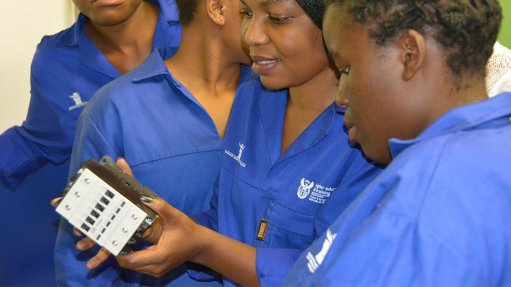ESG just a new way of reporting on what mining companies have already been doing for years, panel says
When considering the challenges involved in junior mining companies living up to increasingly stringent environmental, social and governance (ESG) requirements and reporting standards, mining and environmental law firm Malan Scholes director Hulmes Scholes has noted that ESG is just a new term for reporting what mining companies already do.
As such, junior miners need not be intimidated by it, he told delegates attending the Junior Indaba, in Johannesburg, on May 21.
“It’s a way of reporting on what you're doing already. I don't think it imposes additional requirements on companies. It's an additional way of reporting it,” he said.
Scholes noted that the South African mining industry was already subject to the National Environmental Management Act, must adhere to social and labour plans under the Mineral and Petroleum Resources Development Act and were subject to governance requirements under the Companies Act.
He explained that ESG reporting, according to the methods and standards of different securities exchanges, was just a different way of packaging what companies were already doing.
However, the frustration comes in when companies fail to package it in the very specific and predefined ways, then they are seen as being non-compliant with the rules of the stock exchange. This ultimately means that funders will not fund a mining company that doesn't comply with that reporting standard.
Ultimately, what it comes down to, he implied, is that compliance with ESG standards is not sufficient on its own. Rather, junior mining companies need to report their compliance in the correct format to ensure they are recognised for their efforts.
Investment firm Jempec Group founder and group executive chairperson Jeffrey Mulabisana agreed that a greater focus on ESG was not about getting mining companies to do anything new or different. Rather, it was about stakeholders holding mining companies accountable to comply with the regulations that were already in place and had been for some time.
“So there’s nothing new in that sense. It’s just how all of it gets put together to say, how do we account to the people that have given us the money to establish this mine, to run it responsibly in a sustainable manner in the long term. That’s how simple it should be, especially for junior miners,” he said.
Mulabisana noted that inclusive stakeholder engagement from the outset of projects could foster goodwill and ensure a social licence to operate. He advocated for a collaborative approach, suggesting that a culture of inclusivity could propel the industry forward.
“If you look after the environment, look after the community operating and you looked after the safety of your people, there shouldn't be any other more burden for you to carry, as an operation,” he said.
Junior Mining Council founder and president Fred Arendse noted that, while the principles driving ESG were not new, the social awareness and level of accountability was.
“ESG has actually brought renewed awareness of these issues, which have been around for many years. It’s always been there, but it’s a repackaging and there is now an awareness. Communities are much more informed about what should happen and how they hold mining companies accountable, and, in other sectors of society as well,” he said.
The panellists agreed that junior miners needed to adapt their mindset by integrating ESG considerations into their business strategies from the outset, as embracing ESG reporting standards could distinguish them in a competitive market and attract the necessary investment.
Arendse suggested that compliance should really begin at the inception of mining projects, as early adherence to ESG norms would lower costs and reduce future stress.
When asked whether additional laws were needed to reduce the negative environmental and social impacts of mining, Scholes said that rather than introducing more laws, more effective enforcement of existing regulations to address impacts should be achieved.
“We don’t need more law, we just need enforcement across everything. That includes environmental enforcement and even stopping illegal mining,” he said.
Arendse said junior mining companies needed to view ESG as the right thing to do rather than as a reporting mandate to be begrudgingly complied with.
“We need to do the right thing. We need to look after our people in the right way. We need to look after our environment, we need to look after our communities, we need to do and we need to do in the right way. And they have to police it in the right way as well, because yes, we have challenges of policing,” he said.
Article Enquiry
Email Article
Save Article
Feedback
To advertise email advertising@creamermedia.co.za or click here
Press Office
Announcements
What's On
Subscribe to improve your user experience...
Option 1 (equivalent of R125 a month):
Receive a weekly copy of Creamer Media's Engineering News & Mining Weekly magazine
(print copy for those in South Africa and e-magazine for those outside of South Africa)
Receive daily email newsletters
Access to full search results
Access archive of magazine back copies
Access to Projects in Progress
Access to ONE Research Report of your choice in PDF format
Option 2 (equivalent of R375 a month):
All benefits from Option 1
PLUS
Access to Creamer Media's Research Channel Africa for ALL Research Reports, in PDF format, on various industrial and mining sectors
including Electricity; Water; Energy Transition; Hydrogen; Roads, Rail and Ports; Coal; Gold; Platinum; Battery Metals; etc.
Already a subscriber?
Forgotten your password?
Receive weekly copy of Creamer Media's Engineering News & Mining Weekly magazine (print copy for those in South Africa and e-magazine for those outside of South Africa)
➕
Recieve daily email newsletters
➕
Access to full search results
➕
Access archive of magazine back copies
➕
Access to Projects in Progress
➕
Access to ONE Research Report of your choice in PDF format
RESEARCH CHANNEL AFRICA
R4500 (equivalent of R375 a month)
SUBSCRIBEAll benefits from Option 1
➕
Access to Creamer Media's Research Channel Africa for ALL Research Reports on various industrial and mining sectors, in PDF format, including on:
Electricity
➕
Water
➕
Energy Transition
➕
Hydrogen
➕
Roads, Rail and Ports
➕
Coal
➕
Gold
➕
Platinum
➕
Battery Metals
➕
etc.
Receive all benefits from Option 1 or Option 2 delivered to numerous people at your company
➕
Multiple User names and Passwords for simultaneous log-ins
➕
Intranet integration access to all in your organisation





















